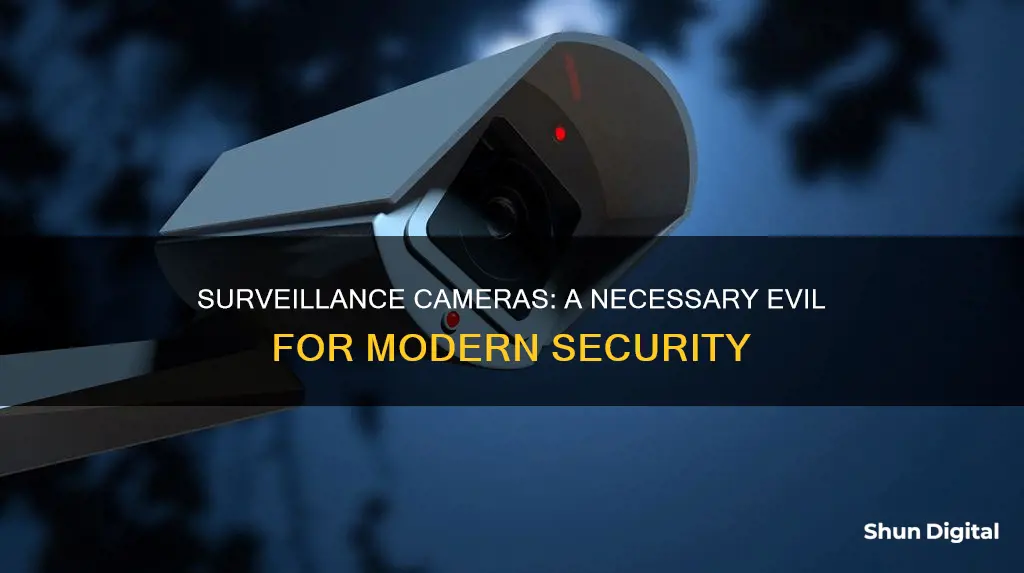
Surveillance cameras are an increasingly common feature of modern life, but are they a helpful tool or an invasion of privacy? In the past two decades, surveillance technology has advanced significantly, becoming more affordable and widely available. Many countries now employ surveillance cameras in public places to monitor population movements and prevent crime and terrorism.
Supporters of surveillance cameras argue that they are an effective way to deter and prevent crime, improve safety, and aid law enforcement. On the other hand, critics argue that they invade privacy, are costly, and can be abused or misused.
So, how important are surveillance cameras? The answer is complex and depends on various factors, including an individual's priorities regarding safety and privacy.
| Characteristics | Values |
|---|---|
| Crime deterrence | Surveillance cameras can deter property damage and reduce crimes like trespassing and burglary. |
| Crime prevention | Surveillance cameras can help prevent shoplifting, theft, and robberies. |
| Crime investigation | Surveillance footage can be used to identify criminals, gather evidence, and aid in criminal investigations. |
| Evidence collection | Surveillance cameras can provide valuable evidence in the event of a break-in, theft, or other crimes. |
| Safety | Surveillance cameras can improve overall safety, protect against vandalism, and enhance customer and employee safety. |
| Security | Surveillance cameras can safeguard businesses and homes, monitor suspicious activities, and reduce the need for additional security personnel. |
| Loss prevention | Surveillance cameras can help prevent and reduce theft, shoplifting, and monetary losses. |
| Compliance | Surveillance cameras can help businesses comply with regulations such as HIPPA, SEC, and internal corporate policies. |
| Monitoring | Surveillance cameras allow remote monitoring of homes, businesses, and high-risk areas. |
| Productivity | Surveillance cameras can improve employee productivity, efficiency, and floor management. |
| Customer experience | Surveillance cameras can be used to monitor customer transactions, track customer traffic patterns, and enhance customer safety and experience. |
| Cost-effectiveness | Surveillance cameras are cost-effective and scalable, reducing the need for hiring additional security personnel. |
What You'll Learn

Crime Deterrent
Surveillance cameras are an important tool in the fight against crime. They act as a visual deterrent, with criminals less likely to target homes or businesses with visible security cameras. In fact, a study by the University of North Carolina found that 60% of burglars would move on to another target if they saw an alarm system or security camera.
The presence of security cameras has been linked to reduced crime rates in several cities. For example, in Orange County, New Jersey, surveillance cameras led to a 50% drop in all types of crime. Similarly, in Baltimore and Chicago, camera systems were associated with reduced crime rates, even in areas without camera coverage.
The benefits of surveillance cameras extend beyond crime deterrence. They can also aid in solving crimes by providing valuable footage for police investigations. This was evident in the Boston Marathon bombing case, where investigators used video images from city cameras to identify the suspects.
Additionally, surveillance cameras can help monitor scenarios and activities, gather evidence, aid in decision-making, and maintain records. They can provide peace of mind for homeowners and business owners alike, allowing them to check in on their properties remotely.
Night Mode Camera: iOS 13's Best Feature?
You may want to see also

Monitor Scenarios and Activities
Surveillance cameras can be used to monitor scenarios and activities in a variety of settings, including homes, businesses, and public spaces. Here are some ways in which surveillance cameras can be utilised for monitoring:
Homes
Home security cameras can provide remote monitoring capabilities for homeowners, allowing them to check in on their property, family, or pets while away. This can be particularly useful for parents who want to ensure their children's safety or keep an eye on babysitters. Modern software features, such as phone alerts when unusual activity is detected, enhance the monitoring experience. Additionally, indoor cameras with facial recognition technology can notify homeowners when specific individuals, such as their children, arrive home.
Businesses
Surveillance cameras are beneficial for business owners who want to oversee daily operations when they are off-site. They can help monitor stock, customer interactions, and employee productivity. In retail establishments, video surveillance can be used to monitor customer transactions and behaviour, aiding in better product placement and understanding customer preferences. Additionally, security cameras can deter employee theft and vandalism, reducing the need for hiring additional security personnel.
Public Spaces
Public security cameras are often installed in places like streets, parks, parking lots, and buildings to monitor activities and ensure public safety. They can help law enforcement prevent and investigate crimes, including theft, vandalism, and terrorism. For example, the Boston Marathon bombing suspects were identified through surveillance camera footage. Additionally, cameras at traffic signals can help prevent speeding and red-light running, improving road safety.
The Evolution of Contax Cameras: A Global Journey
You may want to see also

Evidence and Clues
Surveillance cameras are an important tool for gathering evidence and clues in the event of a crime. They can help identify criminals and provide valuable footage for police investigations. With the advancement of technology, modern security cameras are equipped with high-quality video and audio capabilities, making them even more effective in recording incidents.
The benefits of surveillance cameras in evidence gathering are evident in the case of the Boston Marathon bombing. Investigators were able to quickly identify the suspects by reviewing video images captured by the city's cameras. This led to the swift apprehension of the bombers, demonstrating the crucial role of surveillance cameras in solving crimes.
Surveillance cameras also play a vital role in providing evidence for insurance claims and legal disputes. For instance, offering recorded surveillance video to an insurance company can expedite claims and provide additional details to support verbal accounts. In legal disputes, whether it be criminal or civil cases, surveillance footage can serve as crucial evidence to support or refute allegations.
In businesses, surveillance cameras are invaluable for monitoring customer transactions and employee activities. They can help resolve disputes, improve operational efficiency, and protect against theft and fraud. For instance, in a retail setting, surveillance cameras can be used to review customer transactions and resolve issues, such as claims of rude behaviour by employees or disputes over purchases without a receipt.
Additionally, surveillance cameras can aid in reducing employee theft and improving productivity. A study by Bloomberg Business found that the presence of surveillance cameras in restaurants led to a 22% drop in theft and a 7% increase in profits. This highlights the effectiveness of surveillance cameras in deterring internal theft and improving employee performance.
While surveillance cameras offer significant advantages in evidence gathering and improving public safety, it is important to consider potential drawbacks. Privacy concerns arise as a major issue, with some arguing that surveillance cameras invade personal privacy and can be subject to abuse. Additionally, the effectiveness of surveillance cameras in preventing crimes, especially those committed by determined individuals, has been questioned.
Surveillance Cameras: Legal to Spy on New York Neighbors?
You may want to see also

Dispute Resolution
Surveillance cameras are an important tool for dispute resolution, as they can provide unbiased evidence of events. This can be particularly useful in situations where there are conflicting accounts of what occurred.
For example, in the case of a burglary, a surveillance camera may be able to capture footage of the perpetrator, which can then be used to identify and apprehend them. This can help to resolve disputes between the victim and the police or insurance companies, as well as between the victim and the perpetrator in court.
In addition, surveillance cameras can also be used to monitor and resolve disputes in public spaces, such as shops, schools, and parks. For instance, if a customer claims to have purchased an item but does not have a receipt, or alleges that an employee was rude or provided misinformation, surveillance footage can be reviewed to determine what actually happened.
Surveillance cameras can also help to improve the efficiency of dispute resolution processes. For example, in the case of a car accident, footage from surveillance cameras can be reviewed to quickly determine who was at fault, rather than relying on eyewitness accounts or lengthy investigations.
However, it is important to note that surveillance cameras may also be subject to dispute. For instance, there may be questions about the legality or appropriateness of their placement, or concerns about privacy invasion. As such, it is important for individuals, businesses, and governments to carefully consider the placement and use of surveillance cameras, and to ensure that they are used responsibly and ethically.
Overall, while surveillance cameras can be a valuable tool for dispute resolution, it is crucial to balance their use with respect for privacy and personal rights.
Maya Camera Walk Mode: A Step-by-Step Guide
You may want to see also

Records Maintenance
Surveillance cameras are an excellent tool for maintaining records of events that occur in or around a business or home. The footage captured by these cameras can be used as a reference for future consideration and to monitor how events transpire. This is especially useful in the event of an accident, unintended incident, or criminal activity, as the footage can be reviewed to understand what happened and take appropriate action.
For businesses, surveillance cameras can be used to monitor incoming traffic and keep records of visitors to the property. This can be beneficial for security purposes and also for understanding customer behaviour and improving their experience. For example, by tracking customer traffic patterns, businesses can optimise their inventory placement and stocking to take advantage of high-traffic areas.
Surveillance cameras with audio capabilities can also be useful for maintaining records of conversations and important discussions. In the event of a dispute or disagreement, the footage can be reviewed to clarify what was said and help settle the matter fairly. This can be applicable in both domestic and professional scenarios.
It is important to note that the use of surveillance cameras for records maintenance should consider privacy laws and regulations. Measures should be taken to protect the privacy of individuals and ensure that footage is only accessed and used for appropriate purposes.
In terms of data storage, it is essential to have a secure system in place to store and backup the footage. This can include cloud storage or local storage solutions, depending on the organisation's preferences and requirements. Additionally, a clear data retention policy should be established to determine how long the footage will be kept and when it should be deleted to protect privacy and manage storage space.
Surveillance cameras provide a valuable tool for records maintenance, but it is crucial to use them responsibly and ethically, respecting the privacy and rights of individuals while also utilising the benefits they offer.
Charging the Blackmagic Pocket Cinema Camera 4K: A Guide
You may want to see also
Frequently asked questions
Surveillance cameras are very important for improving safety and security in both public and private spaces. They can deter crime, monitor scenarios and activities, gather evidence, aid decision-making, and maintain records.
Surveillance cameras in public places can improve public safety, reduce crime rates, help catch criminals, provide evidence, and bring convenience to everyday life. They are particularly useful in preventing shoplifting, theft, and vandalism.
Surveillance cameras may raise concerns about privacy invasion and abuse of power. They can be costly to install and maintain, and their effectiveness in preventing crimes, especially those committed by determined individuals, is questionable.







